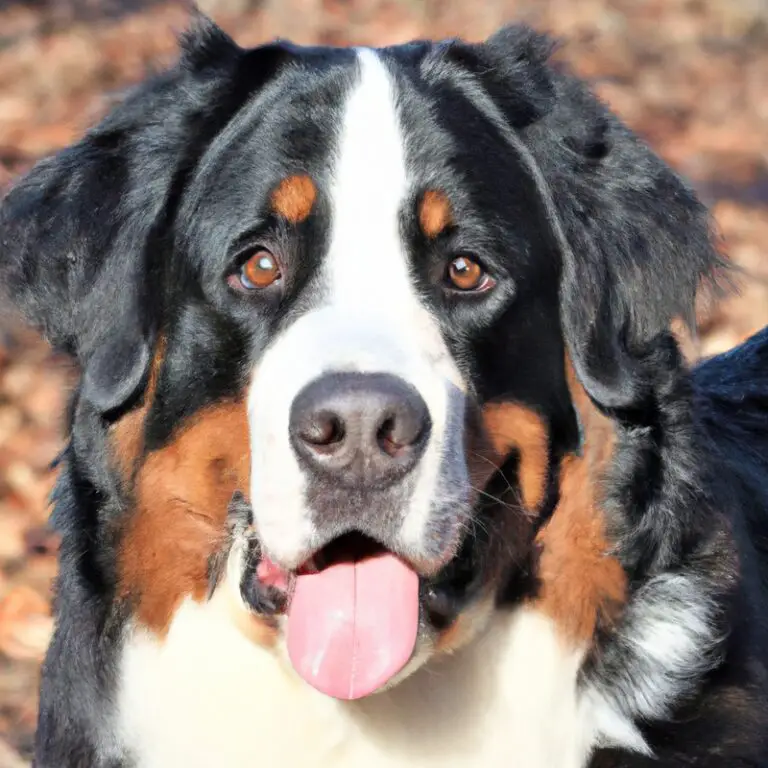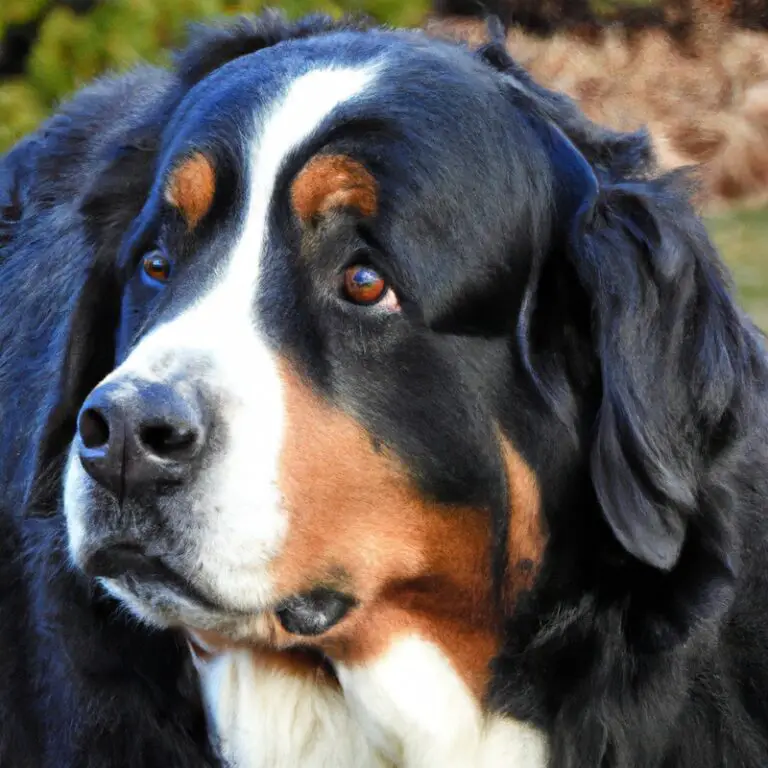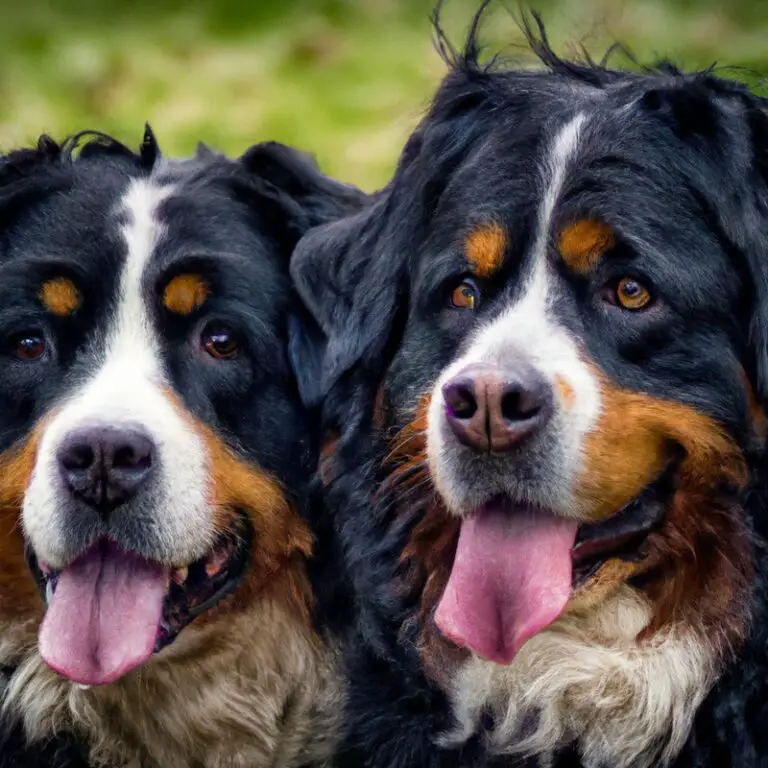Can Bernese Mountain Dogs Live In a Multi-Pet Household?
Key Takeaways:
- Bernese Mountain Dogs can live harmoniously in multi-pet households.
- Proper socialization and training are crucial for a successful coexistence with other pets.
- Bernese Mountain Dogs have a generally friendly and tolerant nature towards other animals.
- Supervision and gradual introductions can help ensure a smooth integration with other pets.
Are you considering adding a gentle giant to your furry family?
Look no further than the Bernese Mountain Dog.
These magnificent dogs are not only known for their striking appearance and loving nature but can also make a great addition to a multi-pet household.
But before you dive headfirst into the world of Berners and other pets, there are some important factors to consider.
In this article, I’ll guide you through the various aspects of bringing a Bernese Mountain Dog into a multi-pet household, including temperament compatibility, size requirements, training needs, introductions, managing interactions, potential challenges, and frequently asked questions.
So, let’s get started and create a harmonious home for all your beloved pets.
| Pros | Cons |
|---|---|
| 1. Bernese Mountain Dogs are generally friendly and get along well with other pets. | 1. Bernese Mountain Dogs are large and may accidentally harm smaller pets. |
| 2. They are known for their patient and gentle nature. | 2. Bernese Mountain Dogs may show dominance or territorial behavior towards other pets. |
| 3. Bernese Mountain Dogs can be trained to live harmoniously with other pets through proper socialization and obedience training. | 3. They may have a higher prey drive towards smaller animals. |
Factors to consider when bringing a Bernese Mountain Dog into a multi-pet household
Temperament and compatibility with other pets
Bernese Mountain Dogs are generally known for their friendly and gentle nature, making them compatible with other pets, like cats and other dogs.
Their calm temperament helps them get along well with other animals in a multi-pet household.
However, it’s important to monitor their interactions and introduce them gradually to ensure a harmonious environment.
Proper socialization and training can further enhance their compatibility with other pets.
Regular exercise and mental stimulation are essential for maintaining their well-being and reducing any potential behavioral issues.
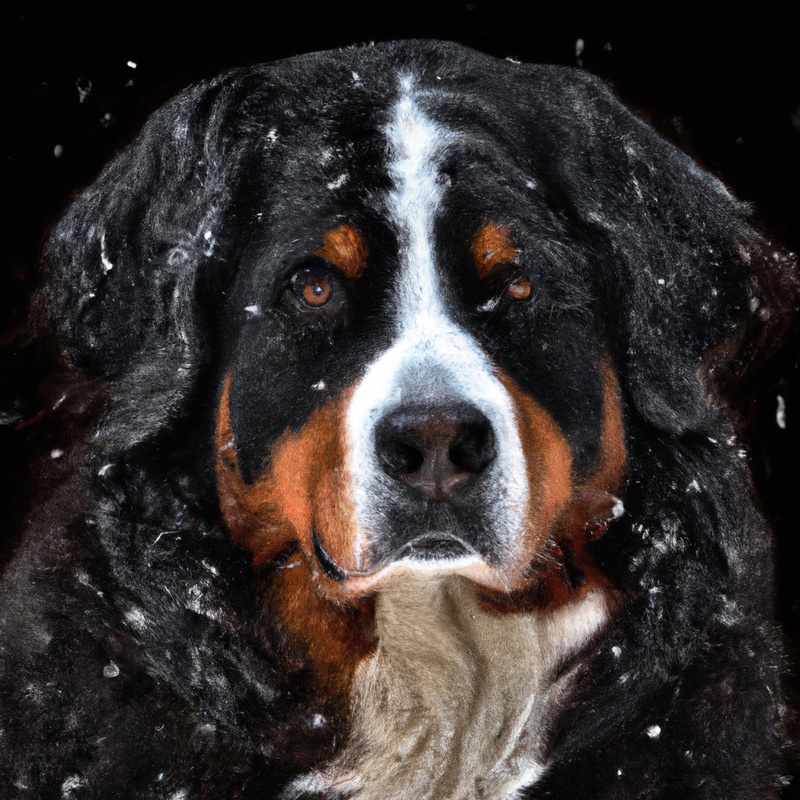
Size and space requirements
When considering bringing a Bernese Mountain Dog into a multi-pet household, it’s important to consider their size and space requirements. These dogs are large and need ample space to roam and play.
They thrive in a home with a securely fenced yard, as they love to explore and have room to run.
Additionally, they need enough space indoors for comfortable living and relaxation. Providing enough room for a Bernese Mountain Dog is essential to ensure their physical and mental well-being.
Training and socialization needs
Training and socialization are important for Bernese Mountain Dogs in a multi-pet household.
It’s best to start early and be consistent.
Use positive reinforcement methods like treats and praise.
Socialize your Bernese Mountain Dog with other animals from a young age and expose them to different environments.
Training should focus on obedience, house manners, and basic commands.
Regular exercise and mental stimulation are also crucial for their well-being.
Consider enrolling in puppy classes or working with a professional trainer to help with training and socialization.
Introducing a Bernese Mountain Dog to other pets
Gradual introductions and supervised interactions
When introducing a Bernese Mountain Dog to other pets, it’s important to proceed with gradual introductions and supervised interactions.
Start by allowing the animals to get acquainted through scent before initiating any direct contact.
Begin with short, controlled interactions in a neutral space, closely observing their behavior and body language.
Keep their meetings positive and reward good behavior.
Gradually increase their time together, always being present to intervene if necessary.
This approach helps promote a smooth and harmonious relationship between your Bernese Mountain Dog and other pets.
Providing a safe and neutral environment
When introducing a Bernese Mountain Dog to other pets, it’s important to provide a safe and neutral environment.
Here are a few tips:
- Start with separate spaces: Allow your Bernese Mountain Dog and other pets to have their own separate areas in the house. This will help them feel secure and prevent any immediate territorial conflicts.
- Gradual introductions: Slowly introduce your Bernese Mountain Dog to the other pets. Begin by allowing them to sniff and investigate each other’s scents through a barrier, like a baby gate. Gradually increase their interaction time over several days.
- Supervise interactions: Always supervise the initial interactions between your Bernese Mountain Dog and other pets. This will allow you to intervene if any signs of aggression or tension arise.
- Positive reinforcement: Reward your Bernese Mountain Dog and the other pets with treats and praise for calm and friendly behavior towards each other. This will help create positive associations and encourage good behavior.
- Patience and time: Remember, it may take time for your Bernese Mountain Dog and other pets to adjust to each other’s presence. Be patient and give them time to develop trust and build a relationship.
By providing a safe and neutral environment, you can help ensure a harmonious introduction between your Bernese Mountain Dog and other pets.
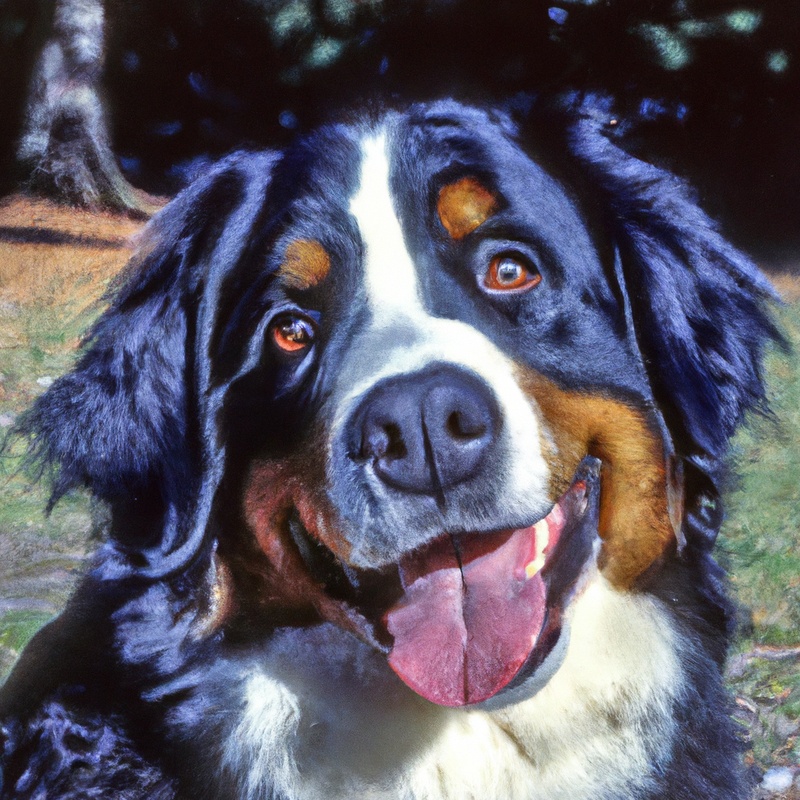
Professional help and consulting with a trainer or behaviorist
If you’re having difficulties introducing your Bernese Mountain Dog to other pets, seeking professional help from a trainer or behaviorist can be a wise decision.
A professional can provide you with valuable insights, guidance, and training techniques specific to your pet’s needs.
They can also assess the dynamics between your pets and provide personalized strategies to create a harmonious multi-pet household.
Consulting with a professional can greatly improve the chances of successful integration and ensure the safety and well-being of all your furry companions.
Managing interactions between a Bernese Mountain Dog and other pets
Establishing routines and boundaries
Establishing routines and boundaries is essential when integrating a Bernese Mountain Dog into a multi-pet household. Firstly, create a consistent feeding schedule for all pets.
This helps prevent food aggression and promotes harmony.
Secondly, establish designated spaces for each pet, such as separate sleeping areas or individual crates. This allows for personal space and reduces potential conflicts.
Lastly, enforce rules and boundaries consistently and fairly.
This ensures that all pets understand their roles within the household and promotes a peaceful coexistence.

Ensuring fair attention and resources for all pets
To ensure fair attention and resources for all pets in a multi-pet household, it’s important to establish a routine that addresses the needs of each animal. Here are some key tips:
- Provide separate feeding areas to prevent competition and ensure each pet receives their fair share of food.
- Schedule individual playtime and exercise sessions with each pet to give them the attention they deserve.
- Create designated sleeping areas or beds for each pet, allowing them to have their own space.
- Monitor interactions between pets to prevent bullying or resource guarding.
- Offer plenty of toys, scratching posts, and enrichment activities to keep each pet mentally stimulated.
- Regularly rotate and alternate interactions with each pet to avoid favoritism and ensure equal attention.
By implementing these practices, you can create a harmonious environment where all pets receive fair attention and resources.
Addressing potential dominance or territorial behavior
Addressing potential dominance or territorial behavior in a Bernese Mountain Dog is important for a harmonious multi-pet household. Here are a few tips to help you manage these behaviors:
- Establish clear boundaries: Set rules and consistently enforce them to establish your authority. This helps your Bernese Mountain Dog understand their place in the pack.
- Socialize early and often: Expose your dog to various environments, people, and animals from a young age. This can help reduce territorial behavior and promote positive interactions with other pets.
- Provide mental and physical stimulation: Engage your Bernese Mountain Dog in regular exercise and mental enrichment activities. This can help prevent boredom and reduce the likelihood of dominant behavior.
- Avoid reinforcing dominant behaviors: Avoid rewarding or encouraging dominant behavior in your dog. Instead, reward calm and respectful behavior to reinforce positive habits.
- Seek professional advice if needed: If your Bernese Mountain Dog’s dominance or territorial behavior becomes problematic, it’s advisable to consult with a professional dog trainer or behaviorist for guidance and support.
Remember, consistency, positive reinforcement, and early socialization are key when addressing dominance or territorial behavior in a multi-pet household.
Potential challenges and solutions in a multi-pet household with a Bernese Mountain Dog
Resource guarding and food aggression
Resource guarding and food aggression can be common challenges in multi-pet households with Bernese Mountain Dogs. These dogs may exhibit possessive behavior over their food, toys, or other valuable items.
To address this, ensure each pet has their own designated feeding area and separate their belongings.
Create a structured feeding routine and use positive reinforcement training to teach your Bernese Mountain Dog to share and give up possessions willingly. It’s important to supervise interactions and provide plenty of mental and physical stimulation for all pets to prevent conflicts.
Separation anxiety and managing alone time
Separation anxiety can be a common issue for some Bernese Mountain Dogs in a multi-pet household. To help manage their alone time and reduce anxiety, there are a few things you can do.
- Gradually introduce alone time: Start by leaving your Bernese Mountain Dog alone for short periods, then gradually increase the time as they become more comfortable being by themselves.
- Create a safe space: Provide a designated area where your dog feels secure when alone, such as a crate or a specific room with their bed and toys.
- Use interactive toys or puzzles: Keeping your dog mentally stimulated can help distract them from feeling anxious. Interactive toys or puzzles can provide entertainment while you’re away.
- Establish a routine: Having a consistent daily routine can help your dog feel secure. Stick to regular feeding, exercise, and alone time schedules.
- Seek professional help if needed: If your Bernese Mountain Dog’s separation anxiety persists or worsens, consider consulting a professional dog trainer or a veterinarian for guidance and support.
Remember, each dog is unique, and finding the right approach may take some time and patience. Be consistent, offer reassurance, and gradually increase their independence to help overcome separation anxiety and manage alone time.
Dealing with potential allergies or health issues
If you’re considering adding a Bernese Mountain Dog to your multi-pet household, it’s important to be aware of potential allergies or health issues that may arise. One common issue is allergies, as some people may be allergic to dogs’ dander.
Regular grooming and keeping your home clean can help reduce allergens.
Additionally, Bernese Mountain Dogs are prone to certain health conditions, such as hip dysplasia and cancer. Regular vet check-ups and a healthy diet can help prevent and manage these health issues.
Frequently Asked Questions
Can Bernese Mountain Dogs get along with cats?
Can Bernese Mountain Dogs get along with cats? Yes, Bernese Mountain Dogs can generally get along with cats.
They have a calm and gentle nature, which helps them coexist peacefully with other animals, including cats.
However, it’s important to introduce them slowly and supervise their interactions initially. Providing separate spaces and positive reinforcement can also ensure a harmonious relationship between your Bernese Mountain Dog and your cat.
Remember, every dog and cat is unique, so individual personalities and temperaments may play a role in their compatibility.
How can I prevent conflicts between my Bernese Mountain Dog and other pets?
To prevent conflicts between your Bernese Mountain Dog and other pets, it’s important to introduce them slowly and under controlled circumstances.
Here’s what you can do:
- Gradual introductions: Allow your pets to get accustomed to each other’s scent by swapping bedding or using a neutral area for the initial face-to-face meeting.
- Supervised interactions: Monitor interactions between your Bernese Mountain Dog and other pets closely, and intervene if any signs of aggression or tension arise.
- Positive reinforcement: Reward good behavior with treats and praise to reinforce positive associations between your dog and other pets.
- Separate feeding areas: Avoid potential conflicts by providing separate feeding areas for each pet to reduce competition.
- Provide individual space: Ensure that each pet has their own designated space, like separate sleeping areas, crates, or beds, where they can retreat and feel safe.
Remember, patience and consistency are key in building positive relationships between your Bernese Mountain Dog and other pets.
Are Bernese Mountain Dogs suitable for homes with small pets like rabbits or birds?
Yes, Bernese Mountain Dogs can be suitable for homes with small pets like rabbits or birds.
However, it’s important to consider their individual temperament and training.
Some Bernese Mountain Dogs have a strong prey drive, which might make them more likely to chase or harm smaller animals.
Proper socialization, training, and supervision can help mitigate any potential issues.
It’s also crucial to introduce them to small pets gradually and under controlled circumstances to ensure their compatibility.
Remember, each dog is unique, so it’s always best to assess their behavior and consult with professionals before making any decisions.
Final Verdict
Bringing a Bernese Mountain Dog into a multi-pet household requires careful consideration and planning. Their temperament, size, and training needs should align with the existing pets.
Gradual introductions, a safe environment, and professional help are crucial in ensuring a smooth transition.
Managing interactions involves establishing routines, attention equality, and addressing potential dominance or territorial behavior. Challenges such as resource guarding, separation anxiety, and health issues can be managed with proper training and care.
Ultimately, with the right approach, a Bernese Mountain Dog can thrive in a multi-pet household and bring joy to the entire family.




